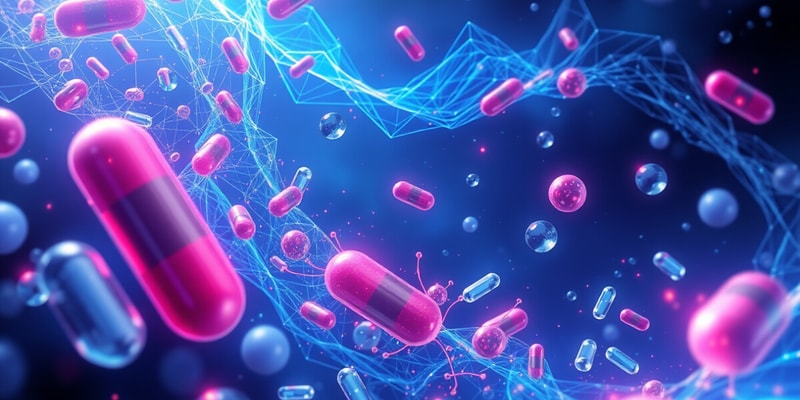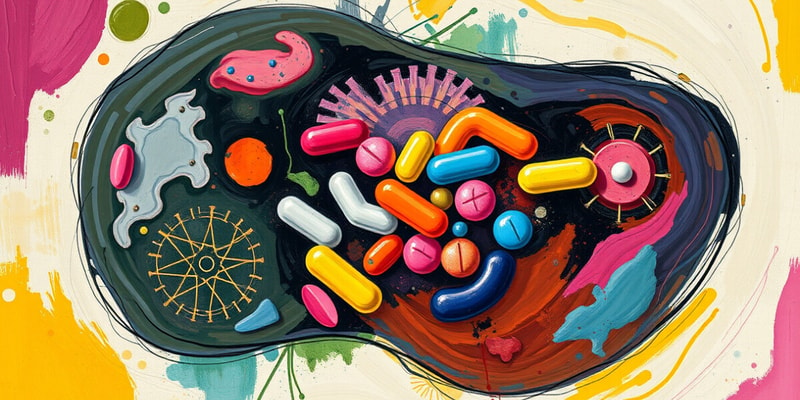Podcast
Questions and Answers
What is the primary therapeutic action of statins?
What is the primary therapeutic action of statins?
Which enzyme do statins inhibit to decrease cholesterol production?
Which enzyme do statins inhibit to decrease cholesterol production?
What significant side effect could result from statin use?
What significant side effect could result from statin use?
Which of the following is a contraindication for statin use?
Which of the following is a contraindication for statin use?
Signup and view all the answers
What dietary substance should be avoided by patients on statins due to its interaction?
What dietary substance should be avoided by patients on statins due to its interaction?
Signup and view all the answers
Which of the following statin medications is not correctly paired with its common name?
Which of the following statin medications is not correctly paired with its common name?
Signup and view all the answers
Which process is not affected by statin medications?
Which process is not affected by statin medications?
Signup and view all the answers
What muscle-related side effect should patients report when taking statins?
What muscle-related side effect should patients report when taking statins?
Signup and view all the answers
What is the optimal time for statin administration?
What is the optimal time for statin administration?
Signup and view all the answers
What is the role of HDL in relation to cholesterol?
What is the role of HDL in relation to cholesterol?
Signup and view all the answers
Study Notes
Statins (HMG Co-A Reductase Inhibitors)
- Statins are lipid-lowering drugs.
- They decrease cholesterol levels.
- They prevent certain cardiovascular events (heart attack, stroke, coronary artery disease, blood clots).
- Drug names usually end in "-statin" (e.g., lovastatin, simvastatin, rosuvastatin, atorvastatin, pravastatin).
- Nystatin is an antifungal agent, not a statin.
Mechanism of Action
- Statins decrease cholesterol production by blocking HMG Co-A Reductase, the enzyme responsible for cholesterol synthesis.
- They reduce LDL ("bad" cholesterol) levels.
- They increase HDL ("good" cholesterol) levels.
- They also decrease triglycerides (a type of fat in the bloodstream).
Side Effects
- Liver damage (hepatotoxicity): Regular monitoring is crucial.
- Myopathy: Generalized muscle pain/weakness.
- Rhabdomyolysis: A serious, life-threatening condition where muscle breakdown releases damaging myoglobin into the bloodstream. Monitor creatine kinase (CK) levels, and patients should report any muscle pain immediately to their provider.
- Gastrointestinal (GI) issues: Nausea, vomiting, diarrhea, constipation, abdominal cramping.
- Headache, Rash: Less common side effects.
- Teratogenic: Contraindicated during pregnancy (Pregnancy Risk Category X).
Nursing Considerations
- Grapefruit juice: Avoid grapefruit juice as it interferes with statin metabolism, potentially increasing side effects.
- Administration time: Best taken at night, as most cholesterol synthesis occurs during the fasting state.
Studying That Suits You
Use AI to generate personalized quizzes and flashcards to suit your learning preferences.
Description
This quiz covers the essential information about statins, including their function as HMG Co-A reductase inhibitors, their impact on cholesterol levels, and the side effects associated with their use. Participants will gain insights into the importance of regular monitoring and the conditions related to statin use.



